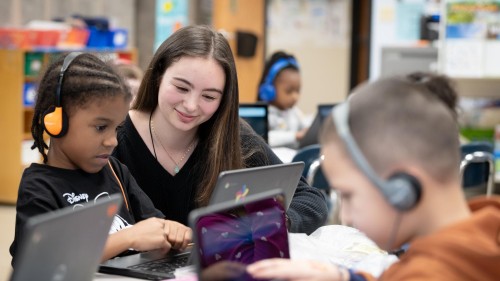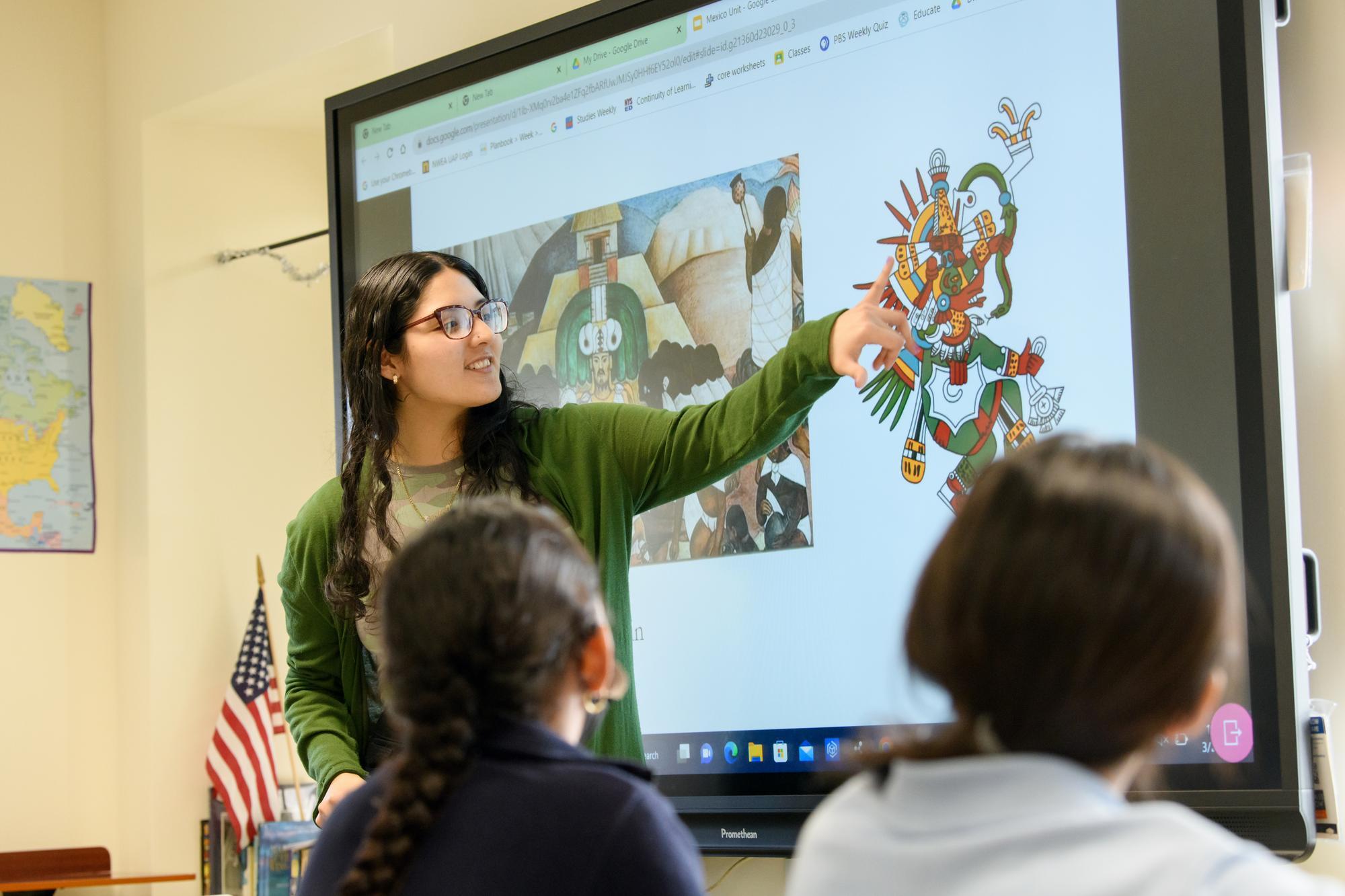
Childhood Education
Why study Childhood Education at the Mount?
Dual Certifications: Teaching Students with Disabilities (All Grades), Early Childhood, Inclusive Early Childhood, and Middle School Extension (7-9)
At the Mount, we recognize that teaching isn’t just another job: it’s a calling and a big responsibility. We’re ready to help you spark knowledge in your future students by preparing you to be the best educator you can be. Upon completion of the program, you will be prepared to teach grades 1-6, with opportunities for additional certifications. Choose from two options that align best with your interests as you pace the way to your own classroom:
With a Bachelor of Science in Education, you’ll be prepared to teach in classrooms for grades 1-6. In classes for this major, we pay special attention to experiential and literacy-based educational methods to enhance learning. As an Education major, you will pair your education major with a 30-credit concentration to enhance your studies: History, Social Sciences, Mathematics - Elementary Mathematics Specialist, English, Biology, Science, or STEM.
Major in an academic area while also earning teacher certification. With a certification in Childhood Education, you’ll be prepared to teach in classrooms for grades 1-6. In classes for this certification, we pay special attention to experiential and literacy-based educational methods to enhance learning. You'll pair your certification with a major in Biology, English, General Science, History, Information Technology, Mathematics, or Social Sciences.
Here's what makes the Mount's Childhood Education program unique:
 Know your stuff: Whether you want to teach at an elementary school or get a dual certification to teach a specific subject at the middle school level, you have to know both how to teach and the subjects you'll be teaching. By the end of your college experience, you'll be ready to confidently lead your own classroom!
Know your stuff: Whether you want to teach at an elementary school or get a dual certification to teach a specific subject at the middle school level, you have to know both how to teach and the subjects you'll be teaching. By the end of your college experience, you'll be ready to confidently lead your own classroom!- Teachers teaching teachers: Who’s the best person to learn teaching from? A teacher, of course! Our professors have taught the very subject and level you want to teach, so who better to learn from than someone who’s been there (and who is also super nice, supportive, and encouraging as well)?
- Real world resources: There are so many resources right here on campus to practice your skills outside the classroom - an on-campus pre-K to eighth grade school, Mount-led literacy programs at local community centers, an active Education honor society, and a dedicated curriculum library on campus.
- Start teaching right away: Don’t start teaching three years from now; start now! Our Childhood Education students start fieldwork (opportunities to practice teaching in real classrooms) in their freshman year. Find out right away if this is the path for you!
Dual Certifications
Working with children with special needs is a calling within a calling, and we applaud your dedication in wanting to work with this audience. By declaring a dual certification in Special Education along with your Bachelor's in Education or Childhood Education certification, you’ll be certified for Teaching Students with Disabilities in all grades.
As part of the Special Education curriculum, your coursework would include classes on working with students with a variety of disabilities, including autism, emotional disturbance, intellectual disability, learning disability, orthopedic impairment, other health impairment, traumatic brain injury, or multiple disabilities.
In order to be certified, students must have completed six hours of study in college level courses in each of four areas: English, Social Studies, Mathematics, and Science (including at least 3 credits of lab science). Most of these are built into the core curriculum for all students, but New York State requires these courses be completed even if they are not met through core.
Extending your certification to teach middle school is a fantastic option. Through this dual certification, you’ll also be certified to teach Grades 7-9 on top of Grades 1-6 in Childhood.
If you have a heart for working with young children, you may want to consider an additional certification in Early Childhood Education, which focuses on skills needed for birth-Grade 2.
Dana McDonough ’91 MSEd ’00 New York State Teacher of the Year 2016“I had many wonderful professors. They helped me to dig deep and see what my strengths were and gave me the tools to help me be the teacher that I am today.”
 Dana McDonough ’91 MSEd ’00
New York State Teacher of the Year 2016
Dana McDonough ’91 MSEd ’00
New York State Teacher of the Year 2016
What to expect as a Childhood Education student
Learn about Childhood Education academic requirements and courses here
You’ll start your Childhood Education journey by taking a series of proficiency tests in freshman year. In order to move on in the program, you’ll need a score of 95% or higher on each exam. Then, you’ll take ED 2051, Orientation to Teaching, your first experience of an education class and fieldwork!
After passing that class, you’ll begin taking higher-level courses in both your subject major and Education major or certification. These classes will teach you practical skills like lesson planning, working with students with special needs, educational development and theory, and more, while also giving you numerous opportunities to practice co-teaching. Throughout, you must maintain an overall 2.75 GPA and receive a C+ or better in all education courses (which can only be repeated once).
As you continue to take classes, you’ll also participate in fieldwork, working towards a total of 100 hours (150 for dual certification in special education).
In your final year, you’ll be a student teacher, spending an entire semester as a teacher in two area classrooms. You’ll keep an online portfolio of your experiences, known as the TPA. Prior to student teaching, you will be required to have completed all of your coursework for both the Education major or certification and your major in your content area.
Upon completing student teaching, you’ll be recommended for certification to NYS.
Sound like a lot? It is a lot of hard work, but take a deep breath: It’s worth it, and you won’t be alone. Our amazing Education professors and staff are ready to walk you through every step of this journey.

Be prepared for your future
Upon graduating and completing the requirements to become certified as an educator in New York State, you’ll be ready to teach!
The Mount has close connections with school districts in the Hudson Valley, which provide numerous opportunities for students to experience fieldwork and student teaching as well as potential job opportunities. Our reputation for training future teachers is widespread, so much so that our professors often get calls from area districts when they have openings, specifically looking to hire Mount education alumni!
Majoring in a content area provides additional job opportunities within that field, and a background in education is useful for careers in educational consulting, museums and nonprofits, college and university administration, educational publishing, and more.
Here's how some of our Education alumni are using their degrees:
- Debra Calvino ’81, Retired Teacher & Director of Curriculum, Instruction and Testing at Valley Central School and New York State Teacher of the Year 2010
- Nancy Benfer ’04, Principal of Bishop Dunn Memorial School
- Christina Antico ’17, NYC School District
- Danielle Petricca '19, MSEd '21, Middletown High School
Education Initiatives
Learn more about some of our Education initiatives, all of which our students are encouraged to participate in!
The Mount Saint Mary College Collaborative for Equity In Literacy Learning (CELL) is a center for excellence at Mount Saint Mary College.
CELL’s mission is to actively conduct research that has a direct impact on classroom literacy instruction and the preparation of teachers of literacy, and that provides support and outreach to teachers, schools, and other stakeholders who have the goal of promoting literacy equity in the surrounding communities.
The Mount Saint Mary College Center for Adolescent Research and Development (CARD) is a clearinghouse for research initiatives. These include the psychological, social, cultural, educational, and health-related issues endemic to contemporary adolescents and young adults.
The center also assists in appropriate research-based program development for schools, agencies, and families.
Kappa Delta Pi is the International Honor Society in Education. The Sigma Tau Chapter was established at the Mount in 1992. Kappa Delta Pi promotes excellence in, and recognizes outstanding contributions to, education. The society endeavors to maintain a high degree of professional fellowship among its members, quicken professional growth, and honor achievement in educational work. Active membership is open to upperclass and graduate students who have completed the appropriate number of credits with the required scholastic average. Membership is open to Mount alumni and faculty.
This special section of the Kaplan Family Library features lesson plans, children’s books, and more.

Bishop Dunn Memorial School is a pre-kindergarten through eighth grade school on the Mount campus.
The college maintains a close relationship with Bishop Dunn. Mount Education students do fieldwork at the school, under the guidance of seasoned Bishop Dunn faculty. Many Mount grads go on to work at Bishop Dunn, including Principal Nancy Benfer ’04.
Meet the Division of Education
Get to know our incredible Education professors, instructors, and staff.
